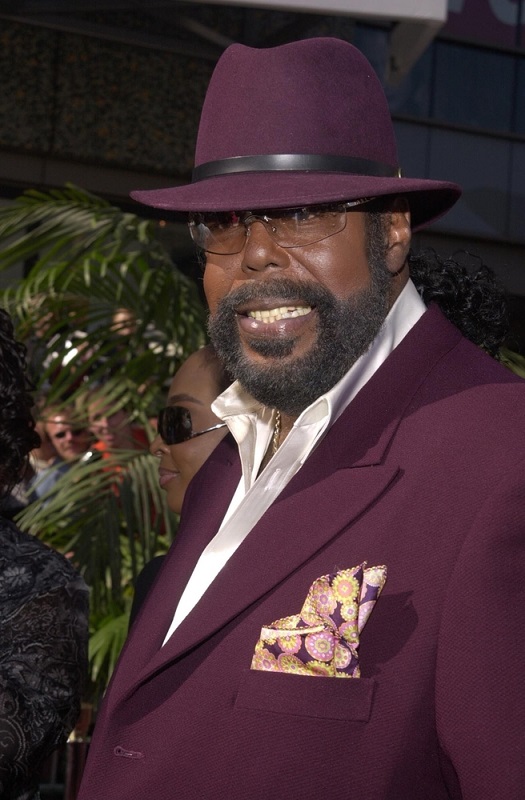Barry White – Biography, Songs, Albums, Discography & Facts

Barry White Biography
Barry Eugene Carter, better known as Barry White, was a singer and composer from the United States. His greatest success came in the 1970s as a solo artist and with The Love Unlimited Orchestra, creating many classic soul, funk, and disco songs like his two biggest hits, “Can’t Get Enough of Your Love, Babe” and “You’re the First, the Last, My Everything.” He is a two-time Grammy Award winner known for his bass-baritone voice and romantic appearance.
On September 12, 1944, in Galveston, Texas, the United States, White was given the name Barry Eugene Carter. White learned to play the piano by copying the songs he heard on his mother’s classical music CDs as he was growing up.
White has frequently been given credit for playing piano when Jesse Belvin recorded the 1956 hit song “Goodnight My Love” at the age of 11. White, however, denied authoring or orchestrating the song in a 1995 interview with the Boston Herald. He thought the article was a journalistic exaggeration. White and Belvin shared a neighborhood, but Belvin was 12 years White’s senior.
White was sentenced to four months in prison when he was 16 years old for stealing Cadillac tyres valued at $30,000. He heard Elvis Presley singing “It’s Now or Never” on the radio when he was incarcerated, which he later credited with altering the path of his life.
White quit the gang life after being released from prison and started a musical career at the start of the 1960s with singing ensembles. In 1960, he made his debut with “Too Far to Turn Around” as a member of The Upfronts. After that, he spent time in Los Angeles working for several small indie companies. In the early 1960s, he also released a number of songs under his own name, backed by the vocal ensembles the Atlantics (for the Rampart and Faro labels) and the Majestics (for the Linda and Jordan labels).
The Love Unlimited Orchestra was founded by White in 1973. It is a 40-piece orchestra that was first intended to serve as a supporting band for the female group Love Unlimited. White, however, had other ideas, and in 1973 he issued a single with “Love’s Theme,” which debuted at No. 1 on the Billboard Pop charts. The song was written by White and performed by the orchestra. Later, in 1974, he created the Love Unlimited Orchestra’s debut album, Rhapsody in White, which included “Love’s Theme.” With the orchestra, White would go on to record several successful albums, including “Rhapsody in White,” “Satin Soul,” “Forever in Love,” “Midnight Groove,” “My Sweet Summer Suite,” and a remake of “Theme from King Kong.” In 1983, the orchestra stopped producing recordings, although it remained White’s backing band.
He produced a number of other songs in the 1970s that finally made up a complete album of music.
He was intending to go by the name “White Heat,” but changed his mind and went by his given name. Up until the moment the label copy was created, White was still unsure. It ultimately evolved into White’s 1973 debut solo album, I’ve Got So Much to Give. It featured the title track and “I’m Gonna Love You Just a Little More Baby,” which also peaked at No. 1 on the Billboard R&B charts and No. 3 on the Billboard Pop charts in 1973 and spent numerous weeks in the top 40.
His final big single, “Staying Power,” which peaked at No. 45 on the Billboard R&B charts, appeared on White’s final album, Staying Power, released in 1999. He received two Grammy Awards for the song in the categories of Best Traditional R&B Vocal Performance and Best Male R&B Vocal Performance. Over the course of his career, White produced 20 studio albums, but a number of remixes and compilations—41 of which were certified gold—were published globally. One of the best-selling musicians of all time, White had 20 gold and 10 platinum hits, with global record sales exceeding 100 million units. James Cleveland, Ray Charles, Aretha Franklin, The Supremes, The Four Tops, and Marvin Gaye were among his musical influences. At the 42nd Annual Grammy Awards in 2000, White received two wins for Staying Power out of 11 nominations.
Barry White Discography
| Staying Power | |
| The Icon Is Love | |
| The Man Is Back! | |
| Dedicated | |
| Beware! | |
| The Man | |
| Let the Music Play | |
| Just Another Way to Say I Love You | |
| Can’t Get Enough | |
| I’ve Got So Much to Give |
Top Videos
Frequently Asked Questions
What Is Barry White Best Album?
Barry White has released numerous albums, but his album “Can’t Get Enough” is widely regarded as his best. It includes popular hits like “You’re the First, the Last, My Everything” and “Can’t Get Enough of Your Love, Babe.” This album is recommended for fans of soulful music.
What Is Barry White Most Famous Song?
Barry White is widely recognized for his song “Can’t Get Enough of Your Love, Babe,” which was released in 1974 and achieved significant success on the charts. His deep, soulful voice and distinctive style established him as a legendary figure in the music industry, and his music remains popular to this day.
What Is Barry White’S Best Selling Song?
“Can’t Get Enough of Your Love, Babe” is Barry White’s best selling song. It was released in 1974 and reached number one on the Billboard Hot 100 chart. The song has been covered by many artists over the years, including Whitney Houston and Michael Jackson.
What Is Barry White’S Famous Album?
Barry White’s famous album is Love Songs. It was released in 1977 and contains the singles “My First, My Last, My Everything” and “Can’t Get Enough of Your Love, Babe”.
What Is Barry White Genre?
Barry White genre of music falls under the soul. He was a singer, songwriter, record producer, and composer. His career in the music industry lasted over four decades. He created some of the most beloved love songs in history. His hits often revolved around love and relationships. As a solo artist, he achieved great success with numerous gold and platinum albums. Although Barry White passed away in 2003, his music remains popular worldwide.
